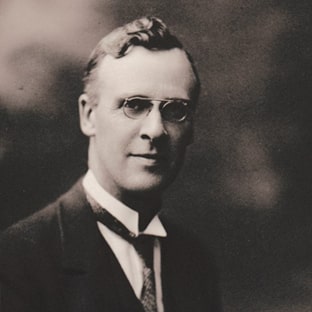
Cyril Oswald Jones (1880 -1969)
Cyril was born in Llanarmon-yn-Ial, Denbighshire in December 1880 as one of seven children.
His father Humphrey Bradley Jones was the Headteacher at the boarding school in Llanarmon-yn-Ial and was a well-known poet, public speaker, musician, and performer at Eisteddfods.
His bardic name was Garmonydd. Cyril was educated at the boarding school, Holyhead British School and Denbigh Grammar School.
Like his father Garmonydd, Cyril trained to be a teacher and worked at a school in Devon for a few years and on the death of his father was acting headmaster of Tregeiriog School for 6 months whilst a successor was appointed.
He decided that he wanted to become a lawyer and having been articled to his brother Fred qualified as a solicitor in 1904.
In 1905 he married Margaret Jane Roberts of Holywell.
He enlisted as a Private in the 6th Battalion Royal Welsh Fusiliers in September 1914 and was granted a Commission in July 1916 before being appointed Appeals Military Representative Denbighshire 1916 – 17.
In 1919 he set up a legal practice in Wrexham called Cyril Jones & Co which still bears his name.
Students applying to study Law at Wrexham University could benefit from the Cyril Oswald Jones Bursary
Content Accordions
-
Cultural Interests
Cyril had an interest in writing and language from a young age.
He later was one of the founders of the Anglesey Eisteddfod Association and secretary of the County Eisteddfod with a huge interest in Welsh culture and language. He had an extensive library of Welsh books.
-
Political Life
Having been a member of the Liberal Party for some years and having acted as Liberal Agent for Anglesey, he joined the Labour Party in 1916. He joined Wrexham Town Council in 1920, was elected Alderman in 1929, Chairman of the Health Committee in 1921 and Mayor of Wrexham Borough in 1937.
Under his Chairmanship of the Health Committee extensive slum clearance took place and the sewage works improved and extended, the Maternity and Child Welfare Clinic was improved and modernised, and he encouraged the immunisation of children against diphtheria. He took a keen interest in the Aid for Refugees and in the Help to Spain Movement during the civil war.
He stood for parliament for Anglesey in 1926 (Labour) and against his brother Fred Llewellyn-Jones (Liberal) for the Flintshire constituency 1929. His brother Fred was elected for parliament and Cyril came second.
-
Legal Career
In 1920 he became Solicitor to the North Wales Miners Association and worked on behalf of the Miners Union and other Trade Unions to gain compensation for accidents. He was the legal representative for the North Wales Miners in the enquiries into the Llay Main Explosion and Gresford Colliery Disaster. The Gresford Disaster occurred on 22 September 1934 at Gresford Colliery, when an explosion and underground fire killed 266 men. Gresford is one of Britain's worst coal mining disasters: the inquiry into the disaster did not conclusively identify a cause, though evidence suggested that failures in safety procedures and poor mine management were contributory factors. Further public controversy was caused by the decision to permanently seal the colliery's damaged districts, meaning that only eleven of those who died were recovered.
He was an early campaigner for legal aid for those who could not afford legal representation and gave evidence to a Parliamentary Committee of Enquiry and was secretary of the North Wales Law Society Poor Persons Committee.
In 1953-1954 he was elected President of the Chester and North Wales Law Society; his son Hywel subsequently held this post in 1968 -1969 and grandson Colin in 1990-1991.
Cyril was a pioneer in enabling individuals from less well-off backgrounds to qualify as solicitors. It was previously the tradition that candidates would have to pay to undertake ‘articles’ to train with a solicitor; he changed this, by not only scrapping the requirement to pay a fee, but by paying the candidate a salary during the period of training. This enabled individuals from a wider social background to qualify as lawyers.
On his death in 1969 newspaper reports referred to him as “The Poor Man’s Lawyer” and a “Champion of Radical Causes”.



